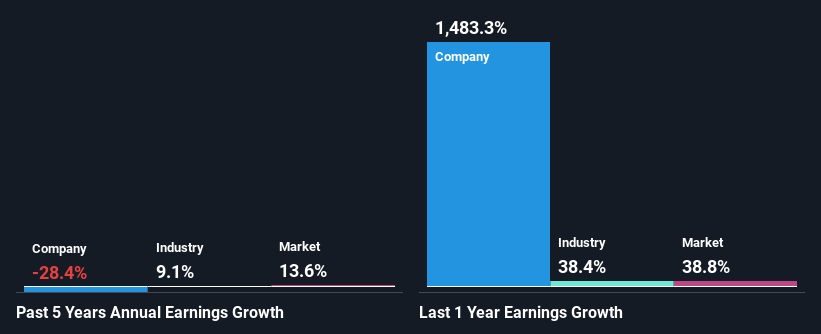Can Hudson Pacific Properties, Inc.'s (NYSE:HPP) Weak Financials Pull The Plug On The Stock's Current Momentum On Its Share Price?
Most readers would already be aware that Hudson Pacific Properties' (NYSE:HPP) stock increased significantly by 5.8% over the past week. We, however wanted to have a closer look at its key financial indicators as the markets usually pay for long-term fundamentals, and in this case, they don't look very promising. Specifically, we decided to study Hudson Pacific Properties' ROE in this article.
Return on Equity or ROE is a test of how effectively a company is growing its value and managing investors’ money. In other words, it is a profitability ratio which measures the rate of return on the capital provided by the company's shareholders.
View our latest analysis for Hudson Pacific Properties
How Do You Calculate Return On Equity?
Return on equity can be calculated by using the formula:
Return on Equity = Net Profit (from continuing operations) ÷ Shareholders' Equity
So, based on the above formula, the ROE for Hudson Pacific Properties is:
0.7% = US$29m ÷ US$4.3b (Based on the trailing twelve months to December 2021).
The 'return' refers to a company's earnings over the last year. So, this means that for every $1 of its shareholder's investments, the company generates a profit of $0.01.
Why Is ROE Important For Earnings Growth?
So far, we've learned that ROE is a measure of a company's profitability. Based on how much of its profits the company chooses to reinvest or "retain", we are then able to evaluate a company's future ability to generate profits. Assuming all else is equal, companies that have both a higher return on equity and higher profit retention are usually the ones that have a higher growth rate when compared to companies that don't have the same features.
A Side By Side comparison of Hudson Pacific Properties' Earnings Growth And 0.7% ROE
It is quite clear that Hudson Pacific Properties' ROE is rather low. Even compared to the average industry ROE of 6.7%, the company's ROE is quite dismal. Therefore, it might not be wrong to say that the five year net income decline of 28% seen by Hudson Pacific Properties was possibly a result of it having a lower ROE. We reckon that there could also be other factors at play here. For instance, the company has a very high payout ratio, or is faced with competitive pressures.
That being said, we compared Hudson Pacific Properties' performance with the industry and were concerned when we found that while the company has shrunk its earnings, the industry has grown its earnings at a rate of 9.1% in the same period.
Earnings growth is a huge factor in stock valuation. What investors need to determine next is if the expected earnings growth, or the lack of it, is already built into the share price. By doing so, they will have an idea if the stock is headed into clear blue waters or if swampy waters await. Has the market priced in the future outlook for HPP? You can find out in our latest intrinsic value infographic research report.
Is Hudson Pacific Properties Making Efficient Use Of Its Profits?
Hudson Pacific Properties has a very high three-year median payout ratio of 51%, implying that it retains only 49% of its profits. However, it's not unusual to see a REIT with such a high payout ratio mainly due to statutory requirements. So this probably explains the company's shrinking earnings.
Additionally, Hudson Pacific Properties has paid dividends over a period of at least ten years, which means that the company's management is determined to pay dividends even if it means little to no earnings growth. Upon studying the latest analysts' consensus data, we found that the company is expected to keep paying out approximately 53% of its profits over the next three years. Regardless, the future ROE for Hudson Pacific Properties is predicted to rise to 1.0% despite there being not much change expected in its payout ratio.
Conclusion
In total, we would have a hard think before deciding on any investment action concerning Hudson Pacific Properties. As a result of its low ROE and lack of much reinvestment into the business, the company has seen a disappointing earnings growth rate. With that said, we studied the latest analyst forecasts and found that while the company has shrunk its earnings in the past, analysts expect its earnings to grow in the future. To know more about the company's future earnings growth forecasts take a look at this free report on analyst forecasts for the company to find out more.
Have feedback on this article? Concerned about the content? Get in touch with us directly. Alternatively, email editorial-team (at) simplywallst.com.
This article by Simply Wall St is general in nature. We provide commentary based on historical data and analyst forecasts only using an unbiased methodology and our articles are not intended to be financial advice. It does not constitute a recommendation to buy or sell any stock, and does not take account of your objectives, or your financial situation. We aim to bring you long-term focused analysis driven by fundamental data. Note that our analysis may not factor in the latest price-sensitive company announcements or qualitative material. Simply Wall St has no position in any stocks mentioned.

 Yahoo Finance
Yahoo Finance 
